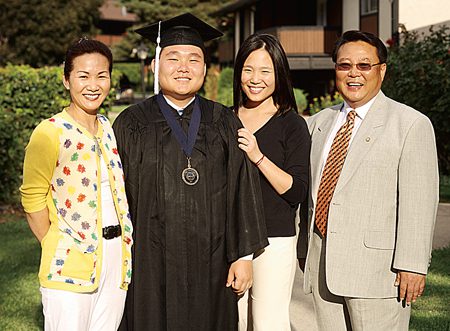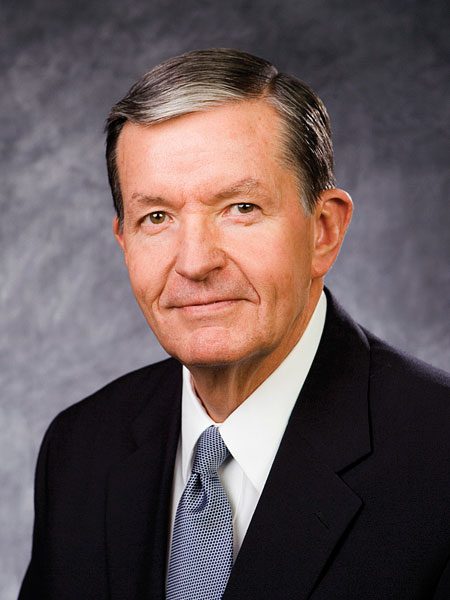By Jennifer Browning
In the fall of 1997, Ralph D. Barney, a retired BYU professor of communications, was on assignment in Africa. In a community in Tanzania, he watched from the roadside as four truckloads of police sped by to stop a protest by some local merchants. It wasn’t until later that he realized the significance of what he had witnessed.
“They went and beat up on these protesting merchants and tore down their stands, but it didn’t show up in the newspapers,” Barney says.
Events like this reminded Barney that an earlier assignment to help draft a national media policy in Malawi and his current work with journalists in Tanzania were not easy. But despite the challenges, he and several members of BYU’s Communications Department have sought to convey the importance of democracy and free press to journalists, students, and government officials in all corners of the world.
Barney was asked by officials from Malawi to work with a committee in drafting a media policy. The policy encouraged media responsibility, government tolerance, and public access to information. However, he found that the people and the government were generally not ready for such democratic principles in their press.
“The government would rather not have the media,” Barney says. “In their culture the media is an intrusion. In a traditional culture people don’t like criticism. The whole notion is that everybody gets along with everybody else–we don’t make each other mad, and we don’t need new information,” Barney says.
“And it’s not just the leaders, but the people in the street, too. Journalists are just troublemakers.” Barney’s committee did successfully draft a media policy, but it has yet to be implemented.
Allen W. Palmer, assistant professor of communications, has found similar attitudes in other parts of Africa over the last several years. As a visiting faculty member at the University of Mauritius and an instructor at a journalism seminar in Benin, Palmer taught that a free press is fundamental to a healthy business economy. But he met with cultural challenges and resistance to the democratic tradition.
“We show up and say that for democracy to work in this country, you really need to have a strong private press,” Palmer says. “But I think they haven’t really absorbed this public service ideal.”
Other parts of the world also struggle to absorb this ideal. Jack A. Nelson, professor of communications, says violence and corruption are some of the greatest hindrances to free press and democratic systems in Nicaragua and Guatemala.
“The press operates under a climate of fear,” says Nelson, who is compiling his research of almost a decade into a book. “In Guatemala there have been 42 journalists killed in recent years. They were murdered for saying something bad about the army or the police or a politician. An editor on the largest newspaper told me, ‘I get death threats everyday.'”
Political tensions in Guatemala climaxed in the early 1990s, Nelson explains, and Guatemala’s president Jorge Serrano Elías grew frustrated with the press over increasing government criticism. In a series of dramatic political moves, Serrano declared martial law, which included taking editorial control of newspapers and radio and television stations in order to control the information released to the public. However, one newspaper was able to print 60,000 copies of an extra exposing the president’s censorship. When citizens realized what was happening, they organized a massive demonstration. The protests were part of nationwide rebellions against the president’s political actions, and within days of the incident the president fled the country.
“The protest was something new, so there is some hope that things will improve,” Nelson says. “That is a hopeful sign–the new attitude of journalism.”
Developing a new attitude toward the press is often a slow process. Russell Mouritsen, associate professor of communications, has worked during the last three years with teams to organize business centers in Moldova and Ukraine, helping people enter the market economy. He found that encouraging a free press was a major step in the process but a step difficult to take because of lingering communist beliefs.
“The media is the tool to educate people, but free press is a very difficult concept,” Mouritsen says. “They think they have it, but there are still caveats in Moldova’s constitution that say the media doesn’t oppose any viewpoints of the government. They still have these vestiges of communism.”
Time seems to be the factor that will prove the success of these professors’ projects. “You don’t change 70 years of views and attitudes overnight,” Mouritsen says.
Perhaps helping the world adapt to democracy is a lofty goal, but these professors are taking the challenge to heart. Mouritsen says, “These efforts we are making on behalf of our government are good efforts. They are the things we ought to be doing. It’s not only a humanitarian but a political thing that needs to be done.”









